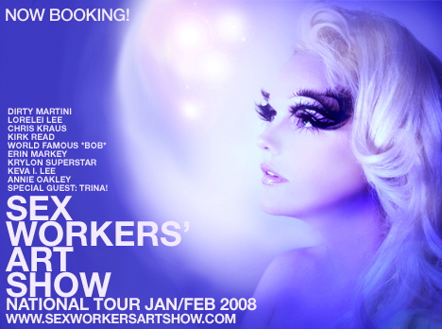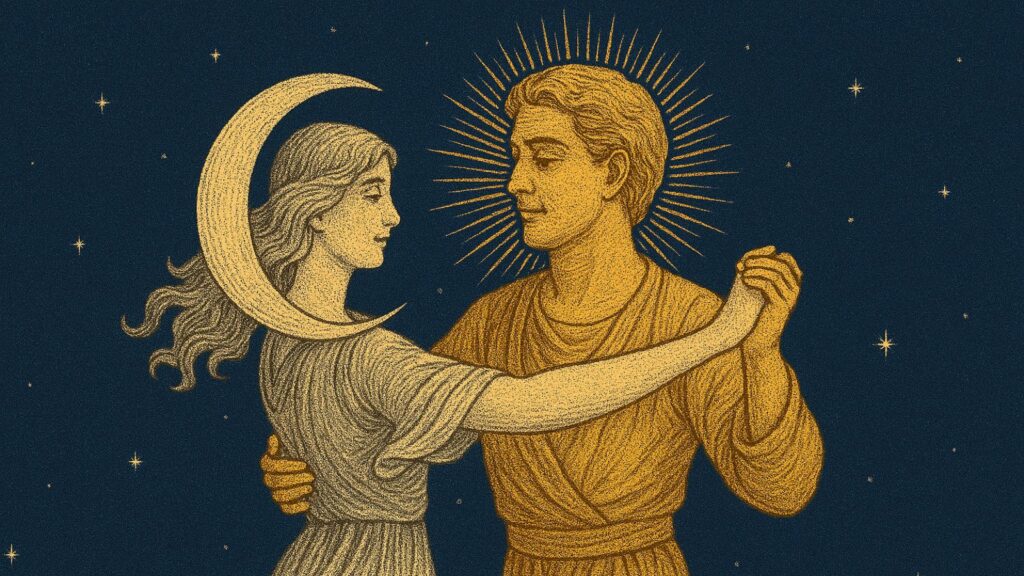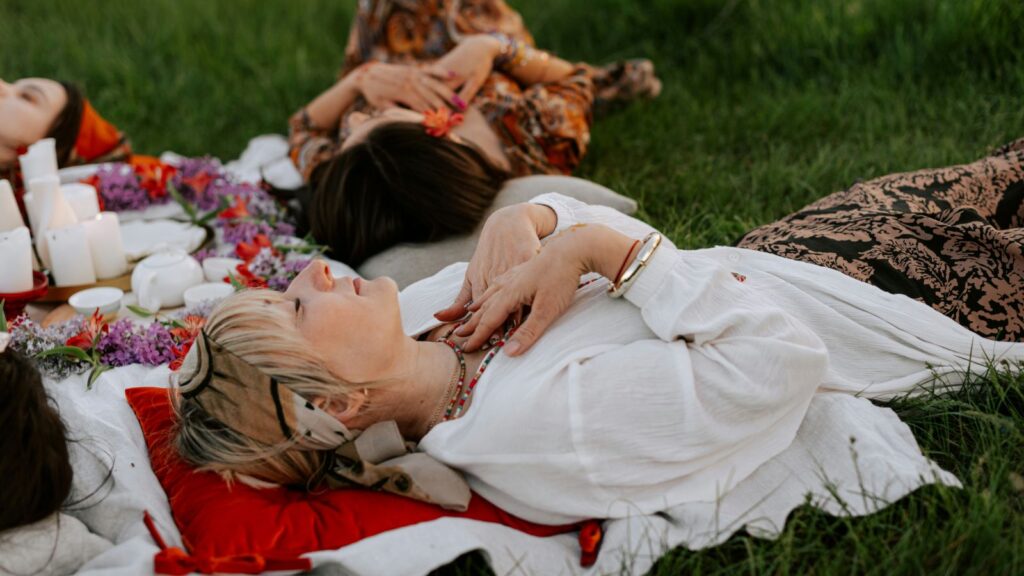Baltimore, MD – I'm on the bus with the Sex Workers' Art Show zigzagging across the United States of America. Organized by the artist-producer Tara Perkins (aka Annie Oakley) SWAS is a visionary cabaret road show featuring acts by eight performers and writers who work, or have worked in the past, in the sex industry. We're at the end of the third week of the tour, or the top of the fourth, we're all too tired to tell, but the trip has been revelatory. Playing to large sold-out houses from the Pacific Northwest to Virginia, featuring performances by New Burlesque luminaries The World Famous Bob, Dirty Martini, Krylon Superstar and Erin Mackey, the show is an affirmation of the transformational collective power of live art.
While the visual art world cautiously flirts with a return to "content" (invoking dead Situationists, European critical theory and mounting theme-based group shows whose artists are so afraid of being branded "political" that their responses to current events are virtually incomprehensible), the topical content of the Sex Worker's Art Show is, in the great tradition of cabaret, brilliant and darkly hilarious and devastatingly direct.
Channeling the artistry of 19th and 20th century striptease, New Burlesque collapses the whole range of vaudeville performance. It's a vision of heaven: full-figured ladies in gorgeous costumes and wigs artfully take off their clothes while telling jokes.
Body positive, sex positive, satire and sex ecstatically meet in a single act. Every night Dirty Martini (aka Linda Martinelli, a refugee from New York's modern dance world) totters onstage as Lady Liberty in a blindfold and star-spangled corset in her dazzling Patriot Act. Dancing to Lee Greenwood's Proud To Be An American, she proceeds to bare all while guiltily gorging herself on dollar bills. The act, created for the Republican National Convention, is the most courageous and visceral response to the Patriot Act I've ever seen.
Like The World Famous Bob – a generous sexy sublime ten-year veteran of New Burlesque known for her appearances from Coney Island to HBO – Martini is a polished and consummately professional entertainer. But it's to Oakley's credit as a producer that the show embraces all ends of the performance art spectrum. Krylon Superstar is perhaps the antithesis of a "professional entertainer." Krylon, a tall slender black man in his early 30s, walks onstage in white tutu and magenta wig and proceeds to sing an original song about the Iraq War acapella. Shunning the professional stripper's élan, he awkwardly removes his corset to reveal the words Fuck Bush taped to his chest, and then wallows with glitter and lube to God Bless America in a kiddie pool. As he helplessly preens, glamour (the word glamour is wrapped with a ‘g' around love, l'amour) and surfeit, aspiration and disgust collide. I've never seen anything like it. "Remaining teachable" is his tagline on MySpace, and the act is pure art – it feels dangerous because it's totally live, rehearsed in his mind during the day and always subject to change.
Emceeing the show night after night Oakley, a powerhouse with pre-Raphaelite red Kool-Aid hair, explains the larger implications of sex work to audiences with incisive charm. A $12 billion dollar a year industry, sex work generates more cash flow than professional sports. It's a curiously American phenomenon that as consumers, we don't want to see what's behind the product. And is it a coincidence that the minimum wage has remained frozen for nearly a decade at $5.15? Oakley's recently-published anthology Working Sex (Seal Press) is a further attempt to adjust our skewed perceptions of sex work. Unlike the abject confessional memoirs of Linda Lovelace or the giddily narcissistic titillation of Lily Burana's Strip City, it is extremely realistic, as inconclusive as life, reporting on the pragmatics of sex work through 22 pairs of eyes.
But for better and worse, the thrilling and vital artistic issues raised by the show have been overshadowed by the highly-organized religious right's full-on vendetta against the tour. Since our first week out, shows have been cancelled by frightened administrators at otherwise liberal institutions like Claremont College. Feminist sex store The Rubber Rose, which hosted the show in San Diego, was forced by the town council to cancel the show at their downtown store and move it to a gay bar in the warehouse district on the outskirts of town.
But the greatest outrage so far occurred in Virginia, where State Attorney General (and Republican gubernatorial candidate) Bob McDonnell re-wrote an existing state statute which had priorly exempted college campuses from Virginia's draconian obscenity laws. The show at Virginia Commonwealth University was cancelled. For two weeks, controversy raged around the scheduled performance at William and Mary College, deemed "way past offensive" by local press and the highly organized religious right who were mostly outraged that sex workers might speak for themselves.
"A disturbing 'art' show is making its way to America's college campuses," reported the right-wing blog CitizenLink. "Prostitutes and pornographers are referred to as 'artists' and 'geniuses.'" Newly-elected Republican State Assembly representative Brenda Pogge wrote to the President of the college urging him to cancel the show. "Williamsburg," she wrote, "is a destination that families come to from across the nation… and learn of our Nation's founding… I believe a show of this nature violates a standard of deceny citizens of this area uphold and wish to maintain…" Finally, Oakley was forced to sign a new contract 'crafted' by McDonnell's office prohibiting cameras and cellphones in the auditorium and allowing the State representatives to pull the plug on the show and withhold payment at any time. One thousand people saw the show on February 4, at two sold-out performances, while Christian protestors prayed outside and police milled around. Unrecorded on any media, the show was a triumph but only those who were physically present will ever know.
I sat behind writer and porn star Lorelei Lee as we drove through colonial Williamsburg, Virginia. She held her digital camera up to the window. We were being run out of Virginia as witches. It was the end of a freakishly warm afternoon, the sky outside the van was getting dark. And I watched the eerily quaint brick and clapboard 18th century houses flash on the screen, through Lorelei's eyes.













